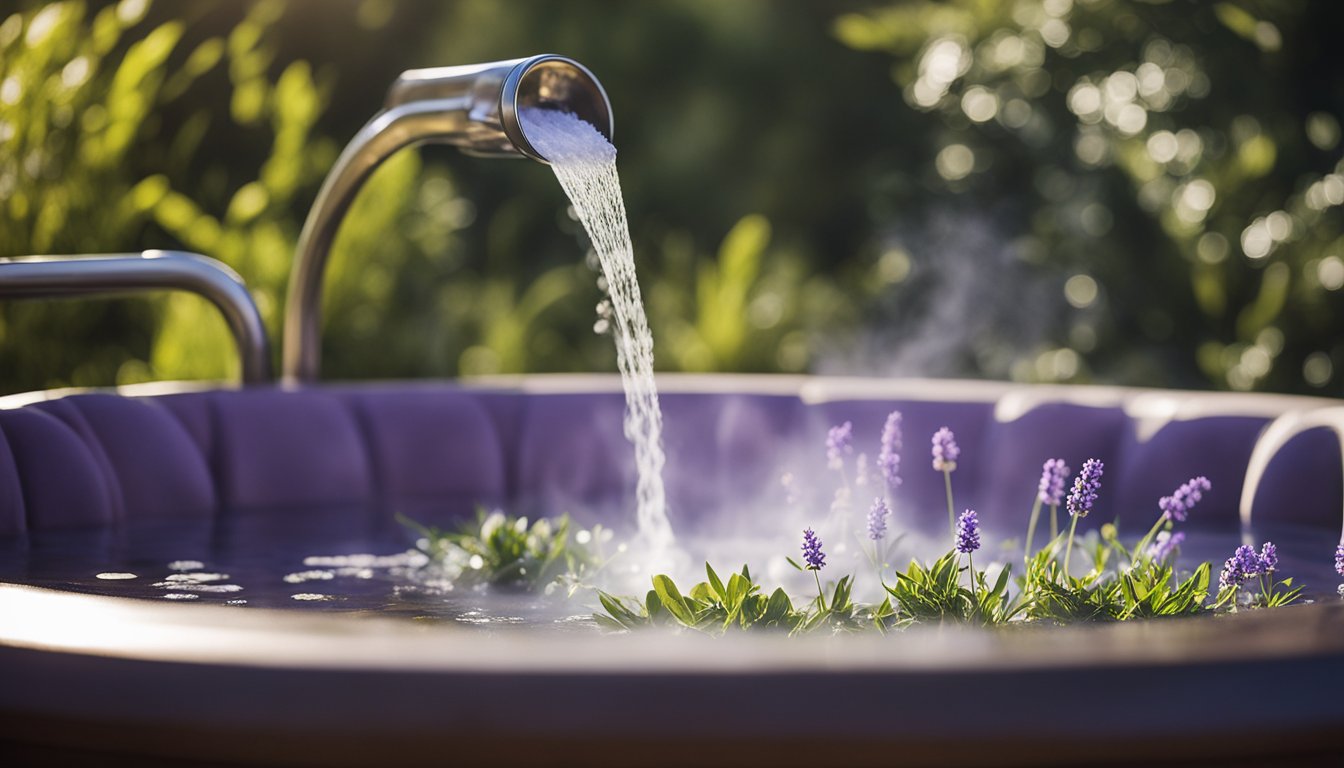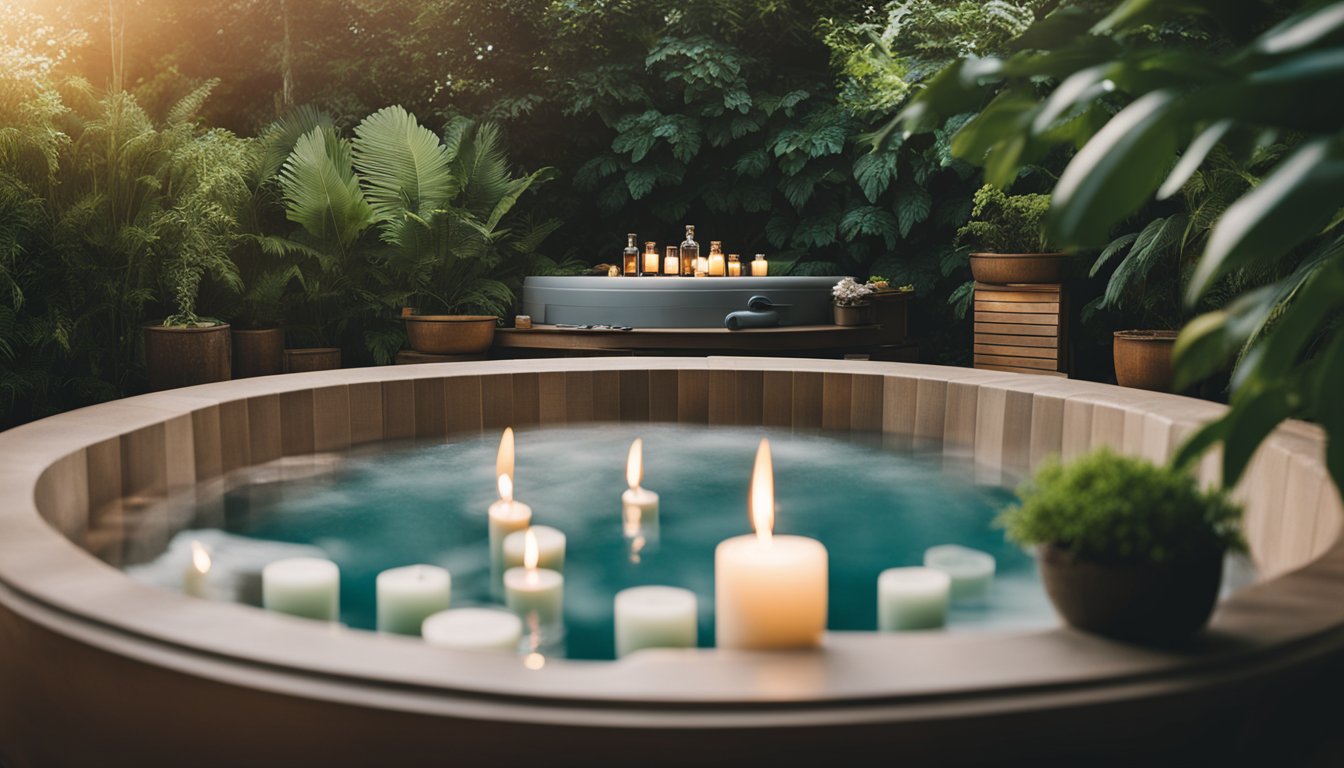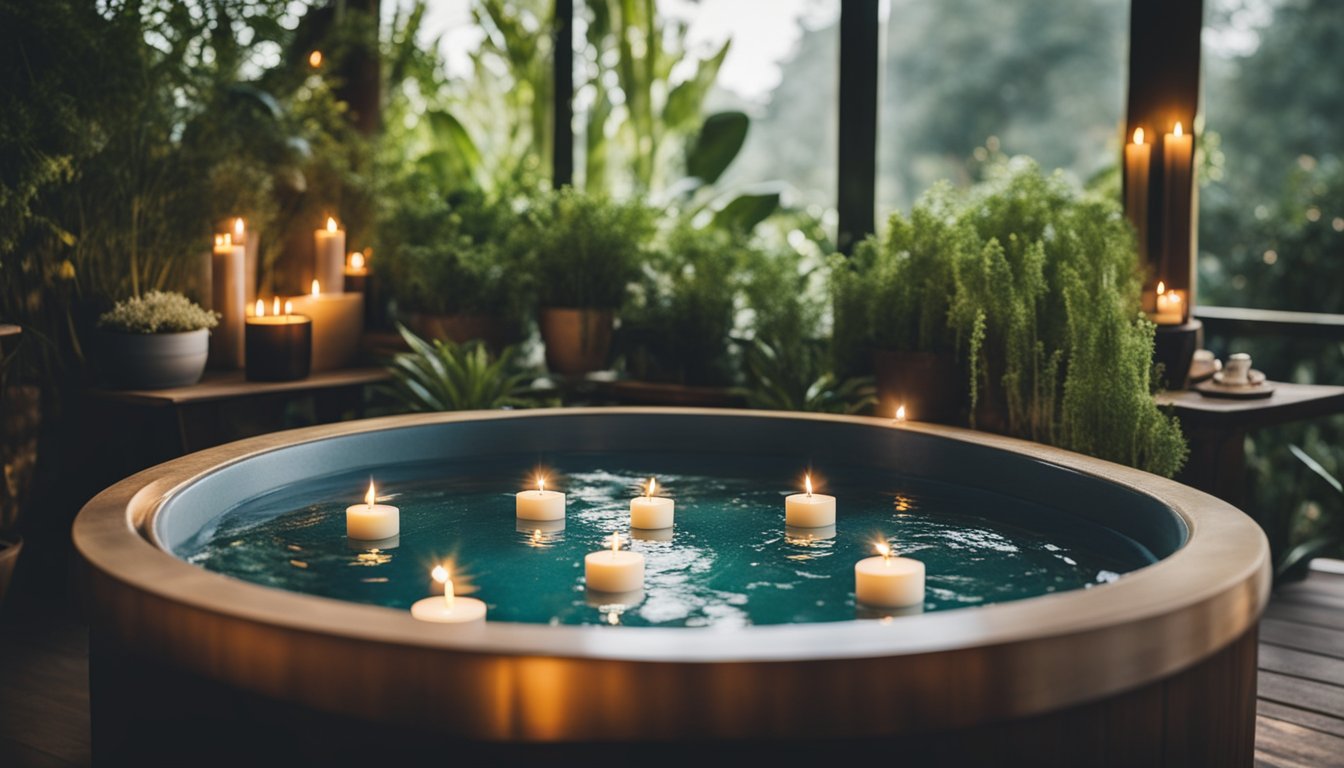Late updated: 03 Aug 2024 15:08
Written by: James Whitaker
Hot Tub Aromatherapy Best Scents For Relaxation: Expert Recommendations for Ultimate Calmness
A good soak in a hot tub can work wonders for our minds and bodies, but adding the right scents can elevate the experience even further. Aromatherapy involves utilising fragrant plant extracts to enhance well-being, primarily through our sense of smell. Lavender is a classic choice, known for its calming properties that help reduce stress and improve sleep quality. By incorporating essential oils into our hot tub sessions, we can transform our regular soak into a deeply relaxing and revitalising ritual.

Different scents can offer distinct benefits; for instance, eucalyptus is excellent for clearing airways and easing respiratory issues, while chamomile can promote a peaceful state and support better sleep. Ginger, with its invigorating aroma, is not only energising but also possesses anti-inflammatory properties that can help soothe aching muscles. Such scents and their therapeutic advantages can turn our hot tub into a personal sanctuary of wellness.
Exploring these scents allows us to tailor our hot tub experience to meet personal needs, whether it's winding down after a long day or seeking relief from physical discomfort. The warm water amplifies the effects of essential oils, allowing us to achieve the utmost relaxation and health benefits with minimum effort. Choosing the right aromatic combination could be the key to unlocking a superior level of relaxation and respite.
Key Takeaways
- Lavender and chamomile are excellent for stress relief and better sleep.
- Eucalyptus and ginger target respiratory issues and muscle pain.
- Essential oils enhance the wellness benefits of a hot tub session.
Understanding Aromatherapy and Its Benefits
Aromatherapy harnesses natural plant extracts to support physical and mental well-being. Integrating aromatherapy into hot tub sessions can enhance relaxation, improve mood, and alleviate stress.
Essentials of Aromatherapy
Aromatherapy employs essential oils extracted from plants. These oils can be used through direct inhalation, topical application, or diffusion into the air. Each essential oil offers unique properties and benefits, lending itself to a wide range of therapeutic uses.
Essential oils can be utilised in various forms, including pure liquid, blends, and specially formulated crystals. Effective application requires knowledge of proper dilution and potential skin sensitivities. For example, users should always test for allergies before extensive use.
The Impact of Aromatherapy on Health and Mood
The benefits of aromatherapy span several areas of wellness, including stress relief, mental well-being, and healing. Specific scents like lavender and chamomile are renowned for their calming effects, promoting better sleep quality and reducing anxiety. Incorporating these scents in a hot tub setting can offer profound relaxation.
Bergamot, with its citrus and floral undertones, is an excellent choice for easing pain and inflammation. Similarly, ginger offers invigorating properties, boosting energy while also providing anti-inflammatory benefits. Regular aromatherapy use can significantly improve overall mood and stress levels.
Aromatherapy in the Spa Environment
Using essential oils in a hot tub creates a hydrotherapy environment that enhances the effects of the oils. The warm water helps to diffuse the essential oils evenly, allowing the aromatic compounds to be inhaled and absorbed through the skin. This synergy maximises the benefits of both the hot tub and aromatherapy.
We recommend adding oils like lavender or chamomile to your spa for an evening soak to improve sleep and promote deep relaxation. Conversely, using more invigorating scents like ginger or bergamot can revitalise and energise you during daytime sessions. Always ensure oils are safe for spa use to prevent any damage to the equipment.
Optimising Your Hot Tub Experience with Aromatherapy Scents

By selecting the right aromatherapy scents and using them safely, we can significantly enhance our hot tub experience. Additionally, maintaining proper water chemistry ensures a safe and pleasant environment.
Choosing the Right Scents for Relaxation
Choosing the correct scents is essential for optimising relaxation. Lavender and Chamomile are excellent for promoting calm and easing stress. These floral aromas create a soothing atmosphere.
Eucalyptus and Peppermint invigorate the mind while relieving muscle tension. These minty scents are perfect for a refreshing soak.
Citrus scents like Tangerine and Lemongrass uplift mood and energise the body, providing a bright and cheerful experience.
For a more romantic and indulgent feel, Jasmine and Ylang Ylang are ideal. Their rich, exotic notes create a luxurious spa ambience.
How to Use Aromatherapy Products Safely in Your Hot Tub
Safety is paramount when using aromatherapy products in our hot tubs. Always opt for hot tub-safe aromatherapy products to prevent damage and maintain water quality. Using essential oils directly can clog filters and disrupt pH levels, so it's best to use aromatherapy crystals or spa-friendly aromatherapy products.
To distribute scents evenly, use an essential oil diffuser, or place aromatherapy beads in the tub. Avoid using oils that may cause skin irritation, and follow the product's usage instructions carefully.
Staying hydrated is crucial, especially when combining heat with aromatherapy, as it can lead to dehydration.
Maintaining Water Chemistry and Hot Tub Care
Proper water chemistry is essential for a pleasant hot tub experience. Ensure the pH, alkalinity, and sanitiser levels are balanced to avoid skin irritation and equipment damage.
Regularly check and clean the filters to prevent clogs from aromatherapy products. Using a water test kit can help monitor the chemical levels accurately.
If using essential oil diffusers or beads, clean them regularly to ensure they function correctly and do not harbour bacteria. Performing routine maintenance will extend the life of the hot tub and keep the water safe and inviting.
These steps ensure a balanced, enjoyable, and long-lasting hot tub experience with the benefits of aromatherapy.
Frequently Asked Questions

Explore the best essential oils for hot tub relaxation, safe introduction methods, spa-like fragrance recommendations, and benefits of using aromatherapy crystals compared to other products.
What are the most effective essential oils for enhancing relaxation in hot tubs?
Lavender, known for its calming properties, and chamomile, which soothes the mind, are top choices. Eucalyptus helps clear airways, adding to relaxation. Peppermint invigorates while also calming. Ensure you choose oils safe for hot tub use.
How can I safely introduce aromatherapy into my hot tub experience?
Dilute essential oils before adding them to avoid skin irritation. Test a small amount on your inner forearm to check for any allergic reactions. Use methods like adding oils directly to the water or using a diffuser for even distribution.
Which fragrances are typically used in spas to promote calm and relaxation?
Spas often use lavender, rosemary, sandalwood, and bergamot for their relaxing and mood-enhancing properties. These scents help create a tranquil atmosphere, reducing stress and promoting a sense of well-being.
Can you recommend any DIY methods for creating spa-like aromas in my hot tub?
Create your own blend by combining essential oils like lavender and eucalyptus. Mix a few drops with a carrier oil before adding to the water. You can also use natural ingredients such as dried herbs or citrus peels soaked in water.
Are there any specific liquid fragrances or crystals designed for use in inflatable hot tubs?
Yes, several products are specially formulated for use in inflatable hot tubs. Look for liquid fragrances and aromatherapy crystals that are specifically designed for this purpose. Always check the product instructions for safe use.
What are the benefits of using aromatherapy crystals in hot tubs, and how do they compare to other scent products?
Aromatherapy crystals dissolve easily, providing consistent fragrance throughout the soak. They often contain minerals that can benefit the skin. Compared to liquid scents, crystals tend to last longer and are less likely to damage hot tub components.
